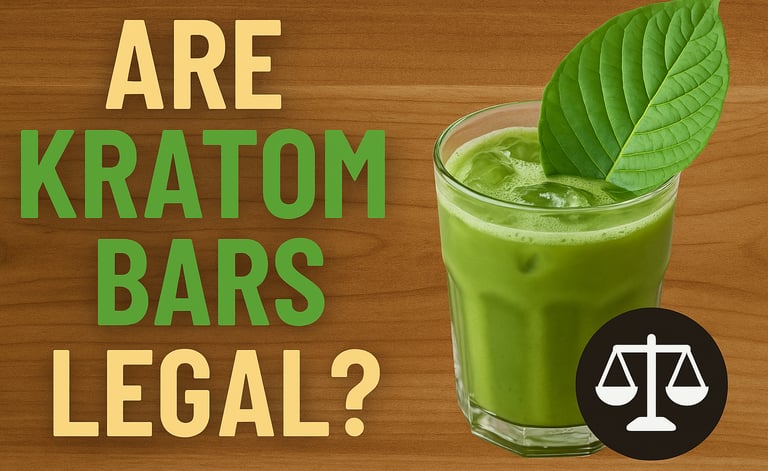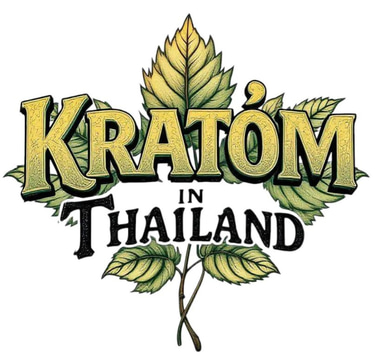High quality - Fast Delivery - Easy payment
Are Kratom Bars Legal? Everything You Need to Know Before You Visit One
Wondering if kratom bars are legal? This detailed guide explores the legal status of kratom bars in different countries and U.S. states, how they operate, what you can expect, and tips for safe and responsible use. Discover the facts, the law, and the lifestyle behind this rising trend.
6/30/20254 min read


Are Kratom Bars Legal? Everything You Need to Know
Introduction: The Rise of Kratom Bars
In recent years, kratom bars have become a growing trend across the United States and other parts of the world. These cozy cafes and lounges offer customers a chance to sip kratom-infused drinks in a social setting — much like a coffee shop or smoothie bar.
But with kratom's legality varying from place to place, many people are asking: Are kratom bars legal? Whether you're a newcomer or a long-time kratom enthusiast, understanding the legal landscape is essential. In this article, we’ll break down what kratom bars are, where they’re allowed, and what you should know before visiting one.
What Are Kratom Bars?
Kratom bars, also known as kratom cafés or lounges, are establishments where people can consume beverages made with kratom — a natural plant native to Southeast Asia. These drinks often come in the form of kratom tea, juices, smoothies, or even carbonated shots.
Most bars offer different strains and "colors" (green, red, and white) that users choose based on their desired effects — whether that’s a boost in energy, a sense of calm, or improved focus.
Kratom bars typically serve only botanical products and often double as a wellness café or herbal tea bar.
Legal Status: Are Kratom Bars Legal?
The answer is yes — but it depends on your location.
Legal in Many U.S. States
Kratom is legal and regulated in many parts of the United States. In states where kratom is permitted, kratom bars operate legally — often under food and beverage laws. Some states have also passed the Kratom Consumer Protection Act (KCPA), which enforces quality standards and age restrictions.
States where kratom is legal (as of mid-2025):
Florida (except Sarasota County)
New York
California (except San Diego)
Texas
Nevada
Colorado (regulated in some counties)
Oregon
Illinois (over 18, except in Jerseyville)
Banned or Restricted in Some Regions
Kratom bars are not legal in areas where kratom itself is banned or restricted. This includes several U.S. states such as:
Alabama
Arkansas
Indiana
Rhode Island
Vermont
Wisconsin
In these states, possession or sale of kratom is illegal — making kratom bars impossible to operate legally.
International Overview
Outside the U.S., kratom laws vary greatly:
Thailand: Kratom was legalized in 2021, and kratom cafés are slowly emerging, especially in rural areas.
Canada: Kratom is not authorized for human consumption, so kratom bars do not operate openly.
Australia & UK: Kratom is banned.
Germany & Czech Republic: Kratom exists in a gray zone; bars are rare but possible under herbal supplement laws.
Always check local regulations before traveling or opening a kratom bar.
What to Expect at a Kratom Bar
When you step into a kratom bar, you’ll usually find:
A menu of kratom drinks, categorized by strain and strength
A welcoming, chill atmosphere, often with music, board games, and a tea-lounge vibe
Staff who are knowledgeable about dosage and effects
In some locations, mocktails and other botanicals like kava are also available
Some bars may even host live events, yoga classes, or open mic nights, offering a community hub centered around natural alternatives.
Safety and Responsible Use
While kratom is a natural product, it affects the brain’s opioid receptors and should be treated with caution.
Tips for Safe Use at a Kratom Bar:
Start Low, Go Slow: Beginners should start with low doses (~1–2g).
Ask Questions: Staff are there to guide you — don’t be shy!
Stay Hydrated: Kratom can be dehydrating. Drink water.
Don’t Mix with Alcohol or Drugs: Especially depressants.
Know Your Body: Everyone reacts differently.
Real-Life Experience: A Customer’s First Visit
“I was nervous my first time at a kratom bar in Austin, Texas. But the vibe was super relaxed. I told the staff I was new, and they recommended a mild green tea. Within 30 minutes, I felt focused but calm. It was nothing like caffeine jitters. I ended up staying for hours talking to people. It felt like a new kind of community.”
— Mark, 34, first-time kratom user
Scientific & Legal Support
Multiple studies have explored kratom’s effects. One review published in Drug and Alcohol Dependence (2021) found that moderate kratom use was not associated with severe health risks in healthy adults. However, heavy use, especially in high doses, may carry risks such as dependency or gastrointestinal issues【1】.
Meanwhile, the American Kratom Association (AKA) actively works to educate lawmakers and promote regulation over prohibition through the Kratom Consumer Protection Act.
“Regulation — not criminalization — is the key to safe access,” says Mac Haddow, senior policy fellow at the AKA【2】.
Conclusion: Are Kratom Bars Legal and Worth Exploring?
In regions where kratom is legal, kratom bars offer a safe, inviting space to explore the benefits of this ancient plant. They're more than just beverage shops — they’re social spots, community centers, and places of discovery.
However, legality depends entirely on where you are. Always check your local laws and start with informed, responsible use. If you’re curious, visiting a kratom bar could be your first step into a whole new world of natural alternatives.
Call to Action
Thinking of visiting your first kratom bar or trying kratom at home? Subscribe to our blog for guides, local listings, and tips on how to get started the smart way.
Stay curious. Stay informed. Stay natural.
References
Olsen, E. O., et al. (2021). Kratom Use and Adverse Health Effects. Drug and Alcohol Dependence, 228, 109018. https://doi.org/10.1016/j.drugalcdep.2021.109018
American Kratom Association. (2024). Kratom Consumer Protection Act Overview. https://www.americankratom.org
U.S. Food and Drug Administration. (2023). FDA and Kratom: Consumer Update. https://www.fda.gov
National Institute on Drug Abuse. (2022). Kratom Drug Facts. https://nida.nih.gov
Global Drug Survey. (2023). Annual Report on Kratom Use Globally. https://www.globaldrugsurvey.com
Terms & Conditions
No sales are permitted to individuals under the age of 18, pregnant women, or those who are breastfeeding. Our products are sold strictly for research purposes only and have not been evaluated by the Food and Drug Administration (FDA) and are not intended to diagnose, treat, cure, or prevent any disease. By placing an order, you acknowledge that you have read, understood, and agreed to these Terms & Conditions. Do not order if you do not agree to these Terms & Conditions.
Contact
info@kratominthailand.com
© 2024. All rights reserved.
Line: botanicals.297
